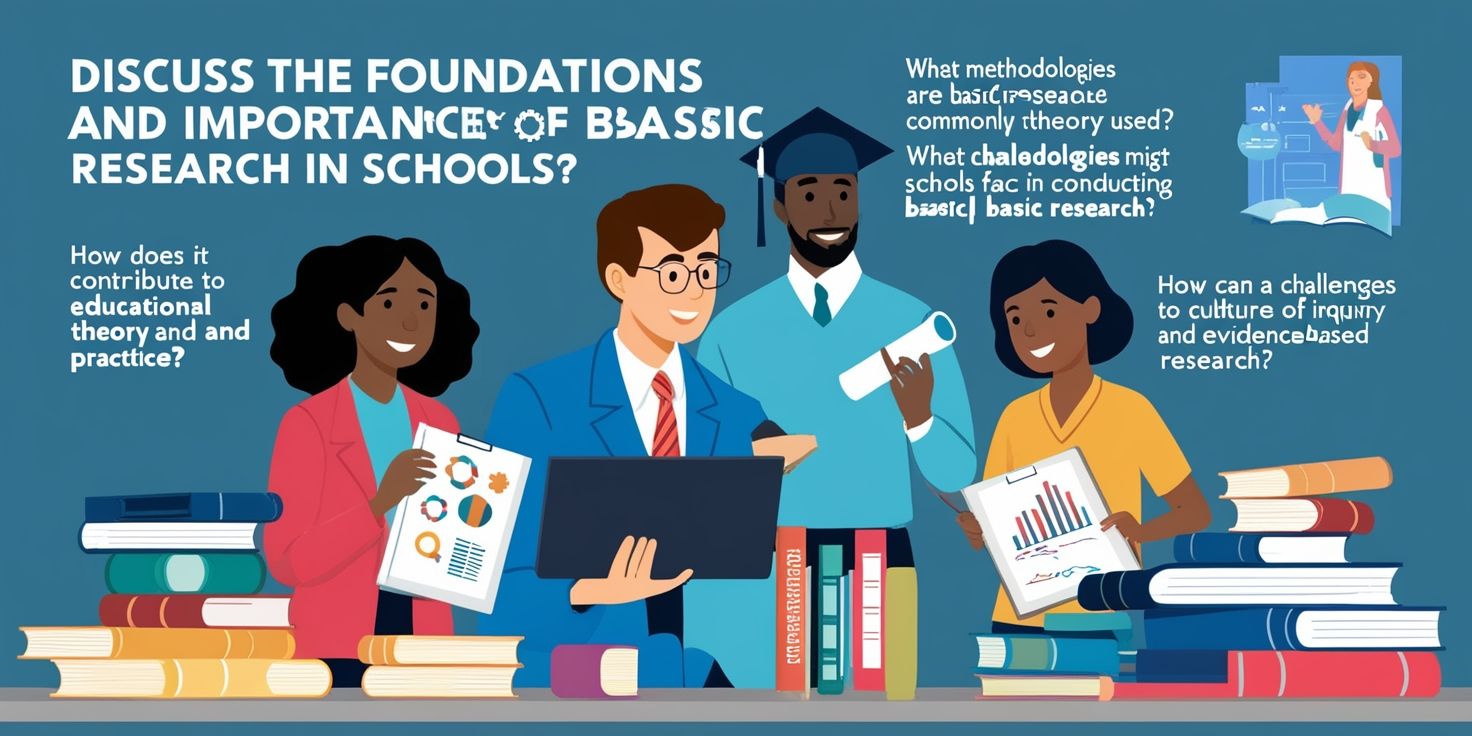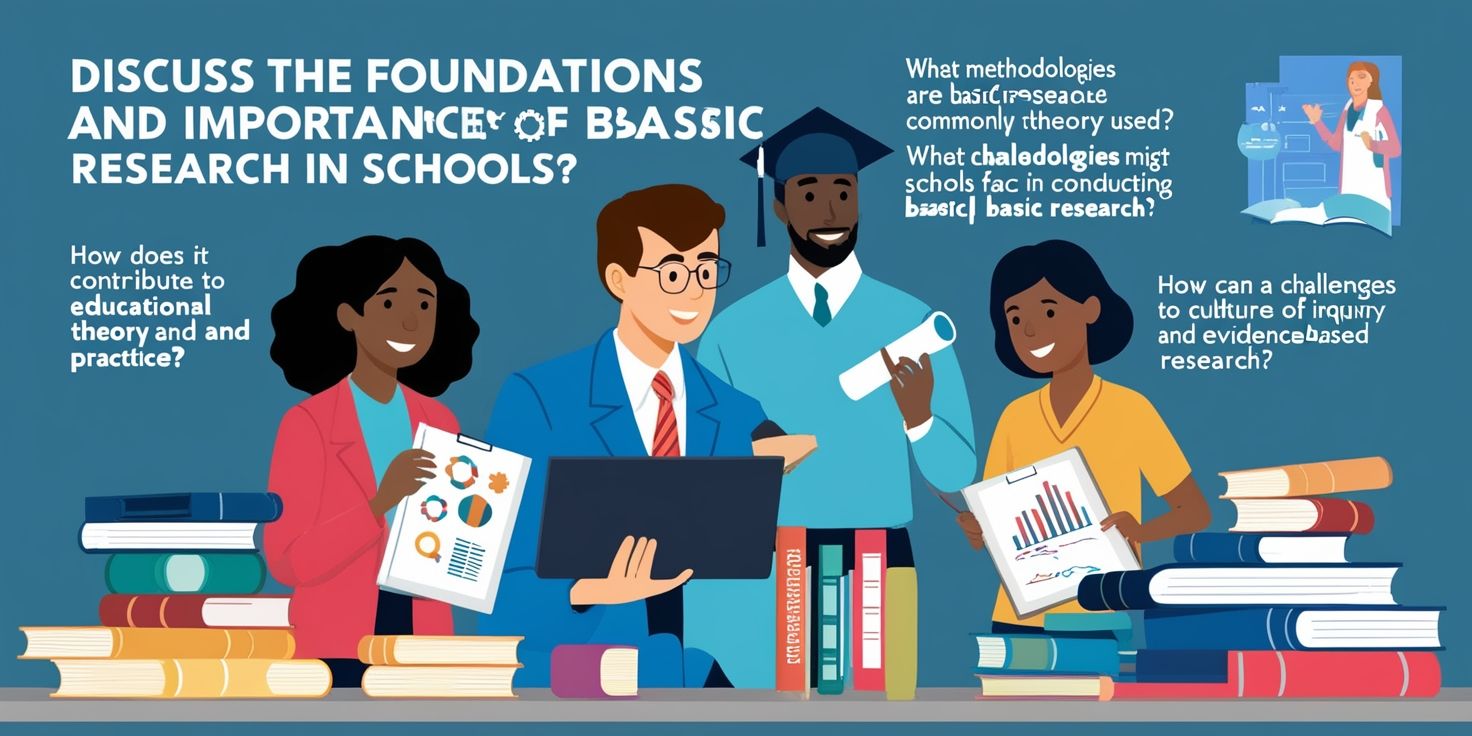Introduction
Understanding Basic Research in Schools or Basic research, often referred to as fundamental or pure research, is the systematic study aimed at gaining a deeper understanding of phenomena without immediate application in mind. In the context of schools, basic research plays a crucial role in fostering a culture of inquiry, enhancing educational practices, and contributing to the overall knowledge base in education. This article explores the significance of basic research in schools, its methodologies, benefits, and the challenges faced in its implementation.
Defining Basic Research in Education
Basic research in education focuses on theoretical understanding rather than practical application. It involves investigating fundamental principles, theories, and phenomena related to learning, teaching, and educational systems. Unlike applied research, which seeks to solve specific problems, basic research aims to expand knowledge and provide a foundation for future studies.

Methodologies in Basic Research
- Literature Review: Conducting a thorough review of existing literature is a critical step in basic research. It helps identify gaps in knowledge, formulate research questions, and build on previous studies. Researchers analyze scholarly articles, books, and other academic sources to establish a theoretical framework.
- Observational Studies: Observational studies involve systematically observing and recording behaviors, interactions, and phenomena in educational settings. This method provides insights into natural occurrences without interference, allowing researchers to identify patterns and relationships.
- Surveys and Questionnaires: Surveys and questionnaires are commonly used to gather data from a large number of participants. These tools help researchers understand perceptions, attitudes, and experiences related to specific educational topics. Well-designed surveys ensure the reliability and validity of the data collected.
- Case Studies: Case studies involve an in-depth examination of a single individual, group, or institution. This method provides a comprehensive understanding of complex phenomena and allows researchers to explore unique contexts and variables.
- Experiments: While less common in basic research, experiments can be used to test hypotheses and establish cause-and-effect relationships. Controlled experiments in educational settings help researchers understand the impact of specific variables on learning outcomes.
Benefits of Basic Research in Schools
- Enhancing Teaching Practices: Basic research provides educators with a deeper understanding of learning processes, cognitive development, and instructional strategies. This knowledge enables teachers to adopt evidence-based practices that cater to diverse student needs and improve overall teaching effectiveness.
- Informing Policy and Curriculum Development: Policymakers and curriculum developers rely on basic research to make informed decisions. Research findings contribute to the development of educational policies, standards, and curricula that align with best practices and address current challenges in education.
- Promoting a Culture of Inquiry: Integrating basic research into school activities encourages a culture of inquiry among students and teachers. It fosters critical thinking, problem-solving skills, and a lifelong love for learning. Students engaged in research projects develop valuable skills in data collection, analysis, and interpretation.
- Contributing to Educational Theory: Basic research expands the theoretical foundation of education by uncovering new insights and refining existing theories. It contributes to the academic discourse, providing a basis for further studies and innovations in education.
Challenges in Implementing Basic Research
- Resource Constraints: Conducting basic research requires time, funding, and access to resources such as academic journals, research tools, and data analysis software. Schools with limited budgets and resources may struggle to support extensive research activities.
- Lack of Training: Educators and students may lack the necessary training and expertise in research methodologies. Without proper guidance, conducting rigorous and ethical research can be challenging, leading to issues with data quality and validity.
- Balancing Research and Teaching Responsibilities: Teachers often face the challenge of balancing their teaching responsibilities with research activities. The demands of lesson planning, grading, and classroom management can limit the time available for conducting research.
- Ethical Considerations: Ensuring ethical practices in research involving human subjects is paramount. Obtaining informed consent, protecting participant confidentiality, and minimizing potential harm are essential considerations that require careful planning and adherence to ethical guidelines.
Solutions to Overcome Challenges
- Professional Development: Schools can invest in professional development programs to enhance the research skills of educators and students. Workshops, training sessions, and collaborations with higher education institutions can provide valuable knowledge and resources.
- Collaborative Research Initiatives: Encouraging collaborative research projects can alleviate the burden on individual educators. Schools can partner with universities, research organizations, and other educational institutions to share resources, expertise, and data.
- Grant Opportunities: Securing grants and funding from government agencies, private foundations, and educational organizations can provide the financial support needed for research activities. Schools can establish grant writing teams to identify and apply for relevant funding opportunities.
- Integration of Research into Curriculum: Embedding research components into the curriculum allows students to engage in research activities as part of their academic requirements. Project-based learning, research assignments, and capstone projects can promote active participation in basic research.
Conclusion
Basic research in schools is a fundamental aspect of advancing educational practices, policies, and theories. It empowers educators with a deeper understanding of learning processes, informs decision-making, and fosters a culture of inquiry. Despite the challenges, schools can overcome obstacles through professional development, collaborative initiatives, and strategic resource allocation. By prioritizing basic research, schools can contribute to the ongoing improvement of education and prepare students for a future of critical thinking and innovation.

eutseo
I’m still learning from you, but I’m trying to achieve my goals. I absolutely enjoy reading everything that is posted on your website.Keep the aarticles coming. I loved it!
ydovme
4zw9az
Looking for the best alarm clock radio with CD player and modern features? This HD tabletop radio combines vintage charm with today’s technology. Features include a CD player, AM/FM radio, dual alarm settings, and a USB port for device charging. Perfect for bedside tables or desktops, the sleek design doesn’t sacrifice performance. Whether you’re waking up to your favorite radio station, a beloved CD, or a gentle buzzer, this unit is your all-in-one morning companion. The CD clock radio is back—and better than ever.
I¦ll right away clutch your rss as I can not to find your e-mail subscription link or e-newsletter service. Do you’ve any? Kindly permit me recognise so that I could subscribe. Thanks.
Wonderful website. Plenty of helpful information here. I¦m sending it to some buddies ans additionally sharing in delicious. And obviously, thanks on your sweat!
I do enjoy the way you have framed this particular issue and it really does present me personally a lot of fodder for consideration. On the other hand, because of what precisely I have observed, I only hope as other feed-back pile on that folks continue to be on point and in no way embark on a soap box involving the news of the day. Still, thank you for this outstanding point and though I do not necessarily agree with this in totality, I value your perspective.
hey there and thank you on your info – I have certainly picked up something new from right here. I did on the other hand experience several technical issues the use of this web site, since I experienced to reload the site lots of instances previous to I may just get it to load properly. I had been brooding about in case your web hosting is OK? Not that I am complaining, however sluggish loading instances times will very frequently have an effect on your placement in google and can harm your quality rating if advertising and ***********|advertising|advertising|advertising and *********** with Adwords. Well I’m adding this RSS to my e-mail and can look out for a lot more of your respective interesting content. Ensure that you update this again very soon..
What i don’t realize is if truth be told how you’re not really a lot more neatly-preferred than you may be now. You are very intelligent. You already know thus significantly when it comes to this subject, made me for my part imagine it from so many varied angles. Its like men and women are not interested except it is something to do with Lady gaga! Your individual stuffs nice. At all times handle it up!
Hi there, i read your blog occasionally and i own a similar one and i was just curious if you get a lot of spam feedback? If so how do you stop it, any plugin or anything you can advise? I get so much lately it’s driving me mad so any help is very much appreciated.
Some truly howling work on behalf of the owner of this site, perfectly outstanding content material.
The next time I read a blog, I hope that it doesnt disappoint me as much as this one. I mean, I know it was my choice to read, but I actually thought youd have something interesting to say. All I hear is a bunch of whining about something that you could fix if you werent too busy looking for attention.
You are my inspiration , I possess few blogs and rarely run out from to brand.
Link exchange is nothing else except it is only placing thhe other person’s
weblog link on your page at appropriate place and other person will also do same in favor of you. https://glassi-freespins.blogspot.com/2025/08/how-to-claim-glassi-casino-free-spins.html
I really enjoy good glass of wine. Whether it’s red or white,
it just elevates aany occasion. Are there any wine lovers around?
#WineTasting
My page :: ไวน์ยกลัง ราคาถูก
ขอบคุณสำหรับข้อมูลเกี่ยวกับพวงหรีดที่ชัดเจน
การรู้ว่าดอกไม้แต่ละชนิดมีความหมายอย่างไร ช่วยให้เลือกได้ตรงความรู้สึกมากขึ้น
จะบอกต่อให้เพื่อนๆ ที่ต้องการเลือกดอกไม้ไปงานศพอ่านด้วย
My website :: ดอกไม้งานศพ
ชอบแนวคิดที่แชร์ไว้ในบทความนี้ครับ ถ้าใครกำลังมองหาร้านจัดดอกไม้งานศพ
ผมแนะนำลองดูร้านที่มีผลงานจริงและรีวิวดี ๆ ครับ
Feel free to visit my web-site รับจัดดอกไม้หน้าศพ
ชอบแนวคิดที่แชร์ไว้ในบทความนี้ครับ ถ้าใครกำลังมองหาร้านจัดดอกไม้งานศพ ผมแนะนำลองดูร้านที่มีผลงานจริงและรีวิวดี ๆ ครับ
My web-site :: ดอกไม้หน้าหีบศพ
Hi! This is my first comment here so I just wanted to give a quick shout out and say I really enjoy reading through your articles. Can you suggest any other blogs/websites/forums that cover the same topics? Thanks a lot!
Slots are such a fun way to unwind! I especially like platforms that make things easy – quick deposits with GCash are a huge plus. Thinking of checking out phww slot download – their ‘Slot Safari’ sounds like a blast! Anyone else tried it? ✨
Hi, just required you to know I he added your site to my Google bookmarks due to your layout. But seriously, I believe your internet site has 1 in the freshest theme I??ve came across. It extremely helps make reading your blog significantly easier.